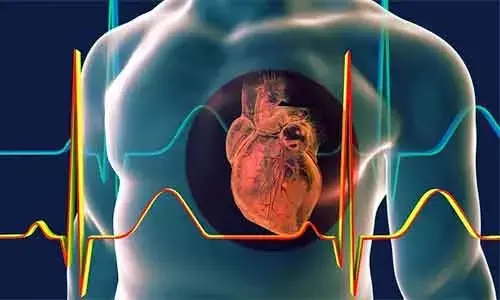- Home
- Medical news & Guidelines
- Anesthesiology
- Cardiology and CTVS
- Critical Care
- Dentistry
- Dermatology
- Diabetes and Endocrinology
- ENT
- Gastroenterology
- Medicine
- Nephrology
- Neurology
- Obstretics-Gynaecology
- Oncology
- Ophthalmology
- Orthopaedics
- Pediatrics-Neonatology
- Psychiatry
- Pulmonology
- Radiology
- Surgery
- Urology
- Laboratory Medicine
- Diet
- Nursing
- Paramedical
- Physiotherapy
- Health news
- Fact Check
- Bone Health Fact Check
- Brain Health Fact Check
- Cancer Related Fact Check
- Child Care Fact Check
- Dental and oral health fact check
- Diabetes and metabolic health fact check
- Diet and Nutrition Fact Check
- Eye and ENT Care Fact Check
- Fitness fact check
- Gut health fact check
- Heart health fact check
- Kidney health fact check
- Medical education fact check
- Men's health fact check
- Respiratory fact check
- Skin and hair care fact check
- Vaccine and Immunization fact check
- Women's health fact check
- AYUSH
- State News
- Andaman and Nicobar Islands
- Andhra Pradesh
- Arunachal Pradesh
- Assam
- Bihar
- Chandigarh
- Chattisgarh
- Dadra and Nagar Haveli
- Daman and Diu
- Delhi
- Goa
- Gujarat
- Haryana
- Himachal Pradesh
- Jammu & Kashmir
- Jharkhand
- Karnataka
- Kerala
- Ladakh
- Lakshadweep
- Madhya Pradesh
- Maharashtra
- Manipur
- Meghalaya
- Mizoram
- Nagaland
- Odisha
- Puducherry
- Punjab
- Rajasthan
- Sikkim
- Tamil Nadu
- Telangana
- Tripura
- Uttar Pradesh
- Uttrakhand
- West Bengal
- Medical Education
- Industry
Levothyroxine may not improve cardiac function in hypothyroid patients with heart attack: JAMA

UK: Treatment of heart attack patients with levothyroxine for hypothyroidism does not improve cardiac function, suggests a recent study in the journal JAMA. The findings of the study, thus, do not support the treatment of subclinical hypothyroidism in heart attack patients.
Mild or subclinical hypothyroidism is a condition characterized by insufficient thyroid hormones. It is very common and affects about 10% of the adult population. Currently, the management of the condition is haphazard due to the lack of high-quality evidence either in favor of or against the treatment. In high-risk conditions such as heart attacks, some clinicians may treat whereas others may not.
Previous studies have suggested an association with cardiac problems including heart attacks, and subclinical hypothyroidism with a higher risk of death. Also, current guidelines suggest levothyroxine treatment in such patients.
Avais Jabbar, Newcastle University, Newcastle upon Tyne, United Kingdom, and colleagues evaluated the effect of levothyroxine treatment on left ventricular function in patients with acute myocardial infarction (AMI) and subclinical hypothyroidism.
For the purpose, the researchers conducted a double-blind, randomized clinical trial across 6 hospitals in the UK. They recruited patients with acute myocardial infarction including ST-segment elevation and non–ST-segment elevation. 95 patients were randomized to receive levothyroxine treatment (n = 46) commencing at 25 µg titrated to aim for serum thyrotropin levels between 0.4 and 2.5 mU/L or identical placebo (n = 49), both provided in capsule form, once daily for 52 weeks.
The primary outcome measure was left ventricular ejection fraction at 52 weeks assessed by magnetic resonance imaging. Among the 95 participants randomized, the mean (SD) age was 63.5 (9.5) years, 72 (76.6%) were men, and 65 (69.1%) had ST-segment elevation myocardial infarction.
Key findings of the study include:
- The median serum thyrotropin level was 5.7 mU/L (interquartile range, 4.8-7.3 mU/L) and the mean (SD) free thyroxine level was 1.14 (0.16) ng/dL.
- The primary outcome measurements at 52 weeks were available in 85 patients (89.5%).
- The mean left ventricular ejection fraction at baseline and at 52 weeks was 51.3% and 53.8%, respectively, in the levothyroxine group compared with 54.0% and 56.1%, respectively, in the placebo group (adjusted difference in groups, 0.76%.
- None of the 6 secondary outcomes showed a significant difference between the levothyroxine and placebo treatment groups.
- There were 15 (33.3%) and 18 (36.7%) cardiovascular adverse events in the levothyroxine and placebo groups, respectively.
"In this preliminary study involving patients with subclinical hypothyroidism and acute myocardial infarction, treatment with levothyroxine, compared with placebo, did not significantly improve left ventricular ejection fraction after 52 weeks. These findings do not support the treatment of subclinical hypothyroidism in patients with acute myocardial infarction," concluded the authors.
The study, "Effect of Levothyroxine on Left Ventricular Ejection Fraction in Patients With Subclinical Hypothyroidism and Acute Myocardial Infarction: A Randomized Clinical Trial," is published in the journal JAMA.
Dr Kamal Kant Kohli-MBBS, DTCD- a chest specialist with more than 30 years of practice and a flair for writing clinical articles, Dr Kamal Kant Kohli joined Medical Dialogues as a Chief Editor of Medical News. Besides writing articles, as an editor, he proofreads and verifies all the medical content published on Medical Dialogues including those coming from journals, studies,medical conferences,guidelines etc. Email: drkohli@medicaldialogues.in. Contact no. 011-43720751


